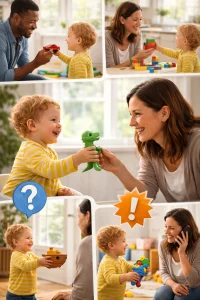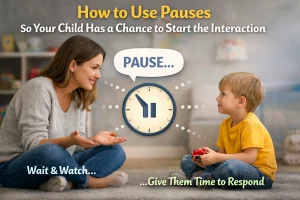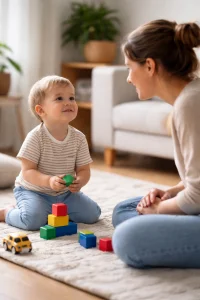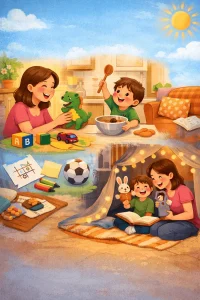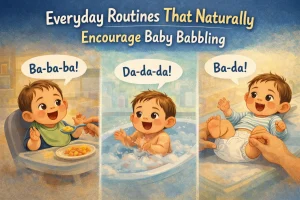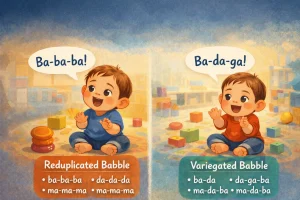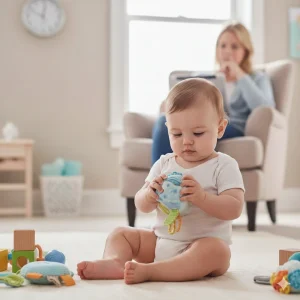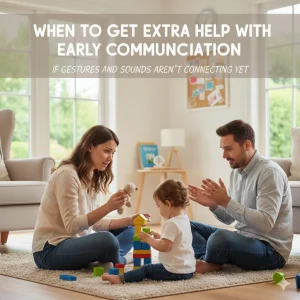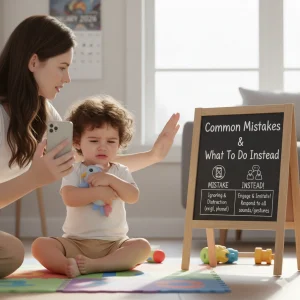Why Your Child May Not Respond to Their Name
Last Updated: June 7, 2025
Is your toddler not responding to name when you call them? It can be a heart-sinking moment — one that leaves many parents feeling unsure, anxious, or even a little scared. But you’re not alone. This is a common concern among families, and recognizing it early is one of the best things you can do for your child’s development.
In this guide, you’ll learn what’s typical for toddler behavior, when not responding might signal something more, and simple ways to support your child’s communication at home. You’ll also see how Wellness Hub provides expert-led online speech therapy to help your toddler thrive.
Explore our online speech therapy for toddlers — guided by licensed experts, designed for your child’s comfort, and easy to access from home.
Speech and Communication Milestones Between 9 and 24 Months
If you’re wondering whether your child’s communication skills are on track, you’re not alone — and asking these questions is a great first step. Let’s take a look at what most toddlers typically do between 9 months and 2 years:
- Respond to Their Name: By around 9 to 12 months, many babies start turning their heads or looking toward you when you call their name.
- Pointing to Communicate: Around the 12-month mark, it’s common for toddlers to point to objects they want, like a favorite toy or snack.
- Using Simple Words: By 12 to 18 months, your child may begin saying simple words like “mama,” “dada,” “ball,” or “bye-bye.”
- Copying Sounds and Actions: Many toddlers love to imitate — whether it’s clapping hands, making silly sounds, or trying to sing along with you.
- Following Simple Directions: Between 15 and 24 months, you might notice your child understanding and following simple instructions, like “Give me the cup” or “Come here.”
- Showing Interest in People and Play: As communication skills grow, so does their social curiosity — smiling at familiar faces, bringing you toys, or laughing during peek-a-boo.
Also read: Speech Development Milestones: Your Child’s Talking Journey
When to Check In About Your Child’s Speech and Communication
While every child grows at their own pace, there are certain signs that could mean it’s time to check in with a professional. Catching concerns early gives your child the best chance to build strong communication skills with the right support.
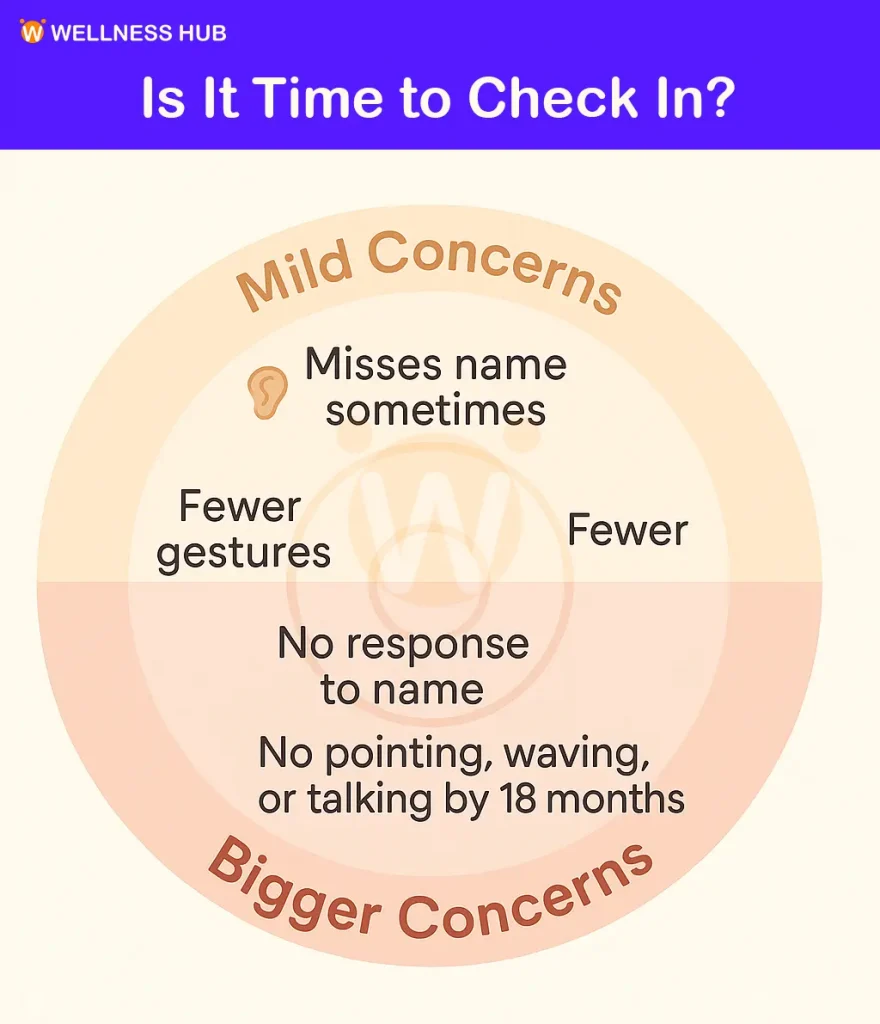
Here are a few signs to gently watch for:
- Rarely or never responding to their name by 12 months
Even after calling several times, your child doesn’t turn or look toward you. - No gestures like pointing, waving, or showing by 12–15 months
Gestures are a big part of early communication. If these aren’t happening, it could be worth a closer look. - Very few or no spoken words by 16–18 months
Most toddlers begin using simple words by this age. Delays in talking may need extra support. - Limited eye contact or social smiling
If your child doesn’t often make eye contact or share smiles with you, it may suggest challenges in connecting. - Seems uninterested in people or surroundings
Toddlers are naturally curious about the world and the people around them. If your child often seems withdrawn, it’s okay to seek advice.
Easy Ways to Help Your Toddler Talk
The good news? You can help your toddler build strong communication skills right at home — and it doesn’t need to be complicated. Small, consistent moments of connection every day can make a big difference.
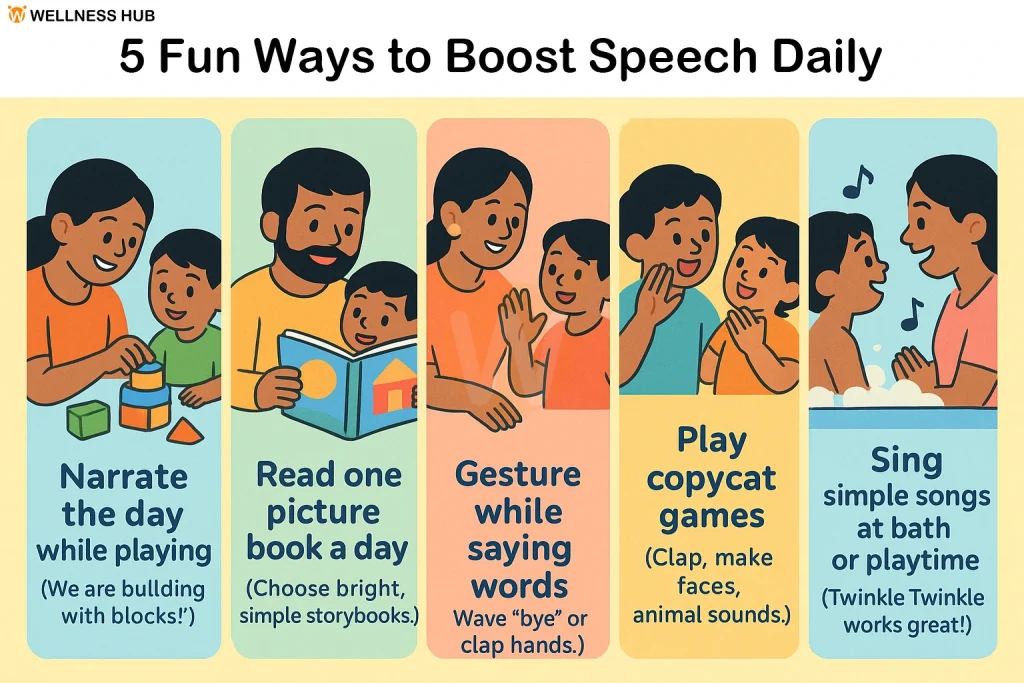
Here are a few simple ways to support your child’s speech development:
- Narrate your daily activities
Talk about what you’re doing throughout the day, even during simple tasks. For example, say, “Now I’m washing the cup,” or “We’re putting on your shoes.” Hearing real-life language helps your child connect words to actions. - Read simple picture books together
Make it a habit to read aloud every day, even if it’s just for a few minutes. Choose books with big, colorful pictures and repeat key words to make it easier for your child to understand and imitate. - Use gestures naturally while you talk
Gestures like waving, pointing, and nodding help reinforce what you’re saying. Pair your words with natural gestures to help your toddler make the connection between actions and language. - Play imitation games
Turn everyday play into a learning moment. You can clap your hands and encourage your child to copy you, make animal sounds together, or even mirror each other’s funny faces. Imitation is a powerful early skill that leads into talking. - Sing songs and nursery rhymes
Songs with simple lyrics and repetitive patterns, like “Twinkle Twinkle” or “The Wheels on the Bus,” are great for building listening, memory, and new words. Plus, singing together makes learning feel like fun!
Every Child is Unique – Early Action Builds Confidence
It’s important to remember: no two children grow in exactly the same way. Some toddlers may say their first words early, while others take a little more time — and both can be perfectly normal. Sometimes, a child just needs a little extra support to find their voice, and that’s nothing to feel worried about.
Trusting your instincts as a parent is one of the best gifts you can give your child. If something feels off, or if you have questions about your child’s speech and communication, reaching out early can make all the difference. Early support builds strong foundations for learning, confidence, and connection. And even small steps now can lead to big progress later.
Conclusion
Taking the first step toward understanding your child’s needs is a big and beautiful act of love — and you should feel proud of yourself for doing it. At Wellness Hub, we know how overwhelming it can feel when you’re worried about your child’s speech or communication skills. That’s why we’re here — to offer not just expert help, but also warmth, understanding, and a partnership you can trust. Whether you’re looking for a simple developmental check-in or ready to start speech therapy, we’ll meet you exactly where you are. Our licensed therapists specialize in working with toddlers and young children, providing personalized care that fits your family’s life and values.
Frequently Asked Questions:
1. Is it normal if my 1-year-old doesn’t always respond to their name?
Sometimes toddlers are busy exploring and might not always respond when you call. However, if your 1-year-old rarely or never turns when you say their name, even when there are no distractions, it could be a sign to check in with a speech therapist. Early response to name is an important communication milestone.
2. When should I worry about my toddler’s speech delay?
You should consider talking to a professional if by 16 to 18 months, your child isn’t saying a few simple words, using gestures like pointing, or following simple directions. Delayed speech milestones don’t always mean something serious, but getting help early can make building communication skills much easier.
3. What are early signs of speech delay in toddlers?
Early signs of speech delay include not responding to their name, not pointing or waving by 12–15 months, having very few or no spoken words by 16–18 months, limited eye contact, and seeming uninterested in people. These are gentle red flags that suggest your child might benefit from some extra support.
4. How can I encourage my toddler to respond to their name?
Make responding to their name fun and rewarding! Use their name during happy moments like playtime or when offering a favorite toy. Get close to their eye level and call them with a cheerful voice. Praise and smile warmly when they respond. Consistent, playful practice helps your child connect their name to attention.
5. Can speech delay fix itself without therapy?
Sometimes children who are late talkers naturally catch up. But if your child is missing several milestones, waiting too long might make it harder to catch up later. Early speech therapy gives your child helpful tools and strategies to learn communication skills faster and with less frustration.
6. What activities help toddlers start talking?
Simple daily activities are powerful! Narrate what you are doing (“We are washing hands”), read colorful picture books, sing easy nursery rhymes like “Wheels on the Bus,” play games that involve copying sounds or actions, and use gestures when you speak. These everyday moments are great for encouraging talking.
7. How does online speech therapy for toddlers work?
Online speech therapy connects you and your toddler to a licensed therapist using video calls. The therapist guides playful activities, games, and parent coaching, so your child learns communication skills in a fun, relaxed way at home. Wellness Hub’s online speech therapy makes it easy and comfortable for families.
8. How soon will I see changes after starting speech therapy?
Each child is different, but many families start noticing small improvements within a few weeks. Some children take longer depending on their needs and how much practice they get at home. Regular sessions, plus simple daily activities, create the best chance for steady progress.
9. Is it my fault if my child has a speech delay?
No, it’s not your fault. Many factors — including genetics, hearing issues, or developmental differences — can affect speech development. The most important thing is recognizing the signs early and getting support. You’re already doing something wonderful by learning and taking action.
10. How can Wellness Hub help my child’s speech development?
At Wellness Hub, we offer personalized, 1-on-1 online speech therapy, early screenings, and family-centered coaching to support your child’s unique journey. Our friendly experts understand the needs of Indian families worldwide, making therapy sessions simple, flexible, and effective for toddlers and young children.
About the Author:
Shilpa Deshpande
Shilpa Deshpande is a skilled speech-language pathologist with over 14 years of experience. Fluent in Kannada, Telugu, Hindi, and English, she specializes in parent counseling, speech sound disorders, fluency assessment, and speech-language evaluations. Shilpa excels at working with children with developmental disorders, offering creative and effective therapy programs. Currently, at Wellness Hub, she holds a BASLP degree and is registered with the RCI. Her patience, ambition, and dedication make her a trusted expert in her field.
Book your Free Consultation Today
Parent/Caregiver Info:
Client’s Details:
* Error Message
